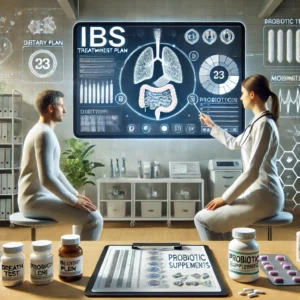Transforming IBS Treatment Through Innovative Breath Gas Chromatography Techniques
Irritable Bowel Syndrome (IBS) is a multifaceted gastrointestinal disorder that impacts millions globally. If you’ve ever faced symptoms like abdominal pain, bloating, or irregular bowel movements, you’re likely aware of the distress this condition can cause. IBS manifests a variety of symptoms that differ widely among individuals, complicating both its diagnosis and management. The diverse nature of IBS symptoms means that what works for one person may not work for another, making effective treatment particularly challenging.
Though the precise origins of IBS remain unclear, it’s commonly thought to arise from a complex interplay of factors, including issues related to gut motility, increased sensitivity within the gastrointestinal tract, and changes to the gut microbiome. As you explore your IBS journey, you may discover that a multitude of elements, such as stress, particular foods, or hormonal fluctuations, can trigger your symptoms. This variability complicates identifying your specific triggers and understanding the root of your discomfort.
In addition, the stigma associated with digestive disorders can foster feelings of isolation and frustration, making it imperative to gain a deeper understanding of IBS. This knowledge equips you to advocate for your health effectively and seek treatment options that can significantly enhance your quality of life.
Essential Insights on IBS and Breath Testing
- IBS is a prevalent gastrointestinal issue marked by symptoms like abdominal pain, bloating, and altered bowel habits.
- Conventional IBS treatments, such as dietary adjustments and medications, may not always adequately address individual triggers or symptoms.
- Breath testing is vital for diagnosing IBS, as it identifies specific patterns of gas production within the gut.
- Breath testing facilitates personalised treatment strategies by detecting triggers like lactose or fructose intolerance.
- Customising IBS treatment based on breath test findings can enhance symptom management and overall patient well-being.
 Understanding the Shortcomings of Conventional IBS Treatments
Understanding the Shortcomings of Conventional IBS Treatments
Conventional strategies for managing IBS frequently adopt a one-size-fits-all approach, which may overlook your unique symptoms and triggers. Many healthcare practitioners primarily rely on dietary changes, medications, and lifestyle modifications to alleviate IBS symptoms. While these methods can relieve some patients, they often prove inadequate for others, leaving them frustrated and seeking alternative solutions.
You may have personally encountered this limitation, experimenting with various diets or medications only to find that your symptoms persist or even worsen. Furthermore, traditional treatments generally focus on alleviating symptoms rather than uncovering the underlying causes of IBS. This can result in a frustrating cycle of trial and error, leaving you powerless in your quest for relief.
The absence of personalised treatment options makes it challenging to discover an effective solution tailored to your needs. Consequently, many individuals living with IBS continue to endure their symptoms in silence, uncertain about how to manage their condition and achieve relief effectively.
Leveraging Breath Testing for Accurate IBS Diagnosis
Breath Gas Chromatography (BGC) is emerging as a revolutionary diagnostic tool for IBS. This cutting-edge technique analyses breath samples for specific gases like hydrogen and methane, providing invaluable insights into your gut health. Unlike traditional diagnostic methods, which may necessitate invasive procedures or extensive testing, BGC presents a non-invasive alternative that can be conducted comfortably.
During breath testing, you exhale into a device that collects samples over a designated period. Analysing these samples can unveil the gases produced during the fermentation of undigested carbohydrates in your gut. Elevated levels of hydrogen or methane may signal specific types of dysbiosis or imbalances in your gut microbiome, potentially contributing to your IBS symptoms.
This non-invasive diagnostic method streamlines the testing process and empowers you with critical information about your unique gut profile, enabling a more focused approach to treatment.
Identifying Specific Triggers with Breath Testing
One of the standout benefits of breath testing is its ability to pinpoint specific triggers that may aggravate your IBS symptoms. By examining the gases in your breath, healthcare professionals can gain insights into how your body processes particular foods and carbohydrates. For example, if your breath test indicates elevated hydrogen levels after consuming certain sugars, it could suggest that you struggle to digest those sugars, resulting in fermentation and gas production in your gut.
This targeted methodology allows you to discern which foods could be problematic. Instead of adhering to a broad elimination diet that may not address your specific triggers, breath testing affords a more tailored approach to symptom management. Collaborating with your healthcare provider, you can develop a personalised dietary plan based on your breath test results, empowering you to make informed nutritional choices.
 Customising Your Treatment Plan Based on Breath Testing Outcomes
Customising Your Treatment Plan Based on Breath Testing Outcomes
After undergoing breath testing and receiving your results, the next logical step is to customise your treatment plan using the insights obtained from your analysis. This personalised approach enables you to tackle the underlying causes of your IBS symptoms instead of merely managing them. For instance, if your breath test reveals an overgrowth of particular bacteria linked to methane production, your healthcare provider might recommend specific dietary adjustments or targeted probiotics to restore balance in your gut microbiome.
Furthermore, understanding your unique gas profile can also influence your medication choices. Some individuals may benefit from medications that specifically address symptoms related to their gas production, while others might need entirely different interventions. By leveraging breath testing results as a foundation for treatment planning, you can collaborate effectively with your healthcare provider to create a strategy that meets your individual needs and preferences.
Exploring the Advantages of Breath Testing in IBS Management
Embracing a Non-Invasive Diagnostic Methodology
The non-invasive nature of breath testing is particularly significant, as it eliminates the physical and emotional distress often associated with traditional diagnostic procedures. By choosing breath testing, you can sidestep the discomfort and anxiety frequently accompanying more invasive testing methods.
Accelerated Results for Efficient Diagnosis
In addition, breath testing delivers rapid results that can hasten the diagnostic process. Instead of enduring lengthy waits for lab results from more invasive tests, you can receive crucial insights into your gut health in a shorter period. This efficiency allows you to implement dietary changes or other interventions more quickly, ultimately leading to better symptom management and a higher quality of life.
Enhanced Management of IBS Symptoms
For individuals with IBS, the ability to receive swift results and initiate treatment sooner is vital. By speeding up the diagnostic process, breath testing empowers you to manage your symptoms proactively. This proactive approach can substantially improve your overall health and well-being.
Significant Improvements in Quality of Life
Ultimately, the benefits of breath testing can profoundly influence your quality of life. By offering a non-invasive, efficient, and effective means of diagnosing and managing IBS, breath testing can help individuals reclaim control over their symptoms and enhance their overall well-being.
Incorporating Breath Testing into Standard IBS Care
As awareness of Breath Gas Chromatography expands within the medical community, integrating breath testing into standard IBS care is becoming increasingly viable. Healthcare professionals are beginning to recognise the value of this innovative diagnostic tool and are progressively incorporating it into their practices. If you are seeking treatment for IBS, discussing the possibility of breath testing with your healthcare provider is crucial.
Your provider may direct you to specialised clinics or laboratories that offer breath testing services. As this method gains broader acceptance, more healthcare practitioners will likely receive training in its application and interpretation. This shift could lead to enhanced diagnostic accuracy and tailored treatment plans for individuals like you navigating the complexities of IBS.
 The Promising Future of IBS Treatment Through Breath Testing
The Promising Future of IBS Treatment Through Breath Testing
Integrating breath gas chromatography into clinical practice appears to be the future of IBS treatment. As research continues to investigate the connections between gut health and various gastrointestinal disorders, breath testing may be more pivotal in understanding these relationships. With advancements in technology and a growing body of evidence supporting its effectiveness, BGC has the potential to revolutionise the diagnosis and management of IBS.
Beyond improving diagnostic precision, breath testing may pave the way for more personalised treatment strategies explicitly tailored to your needs. As healthcare providers deepen their understanding of how different gases correlate with various symptoms and triggers, they will be better equipped to develop targeted interventions that address the underlying causes of IBS rather than solely alleviating symptoms. Ultimately, Breath Gas Chromatography represents a monumental shift in the IBS diagnosis and management landscape.
By providing a non-invasive method for analysing breath samples and pinpointing specific triggers, BGC empowers individuals like you to take charge of your health journey. As this innovative approach continues to gain traction within the medical community, it can transform the understanding and treatment of IBS, leading to improved outcomes and a better quality of life for those affected by this complex condition.
If you’re interested in exploring alternative treatments for IBS, consider visiting the blog section of MCR Therapies’ website. One article that stands out discusses the benefits of acupuncture and dry needling for digestive issues like IBS. The article delves into how these treatments can alleviate symptoms and enhance overall gut health. To learn more, you can check out their blog here. If you’re curious about trying acupuncture or dry needling for your IBS, you can reach out to MCR Therapies here.
Frequently Asked Questions About Breath Testing for IBS
What exactly is breath testing for IBS?
Breath testing for IBS is a non-invasive diagnostic method for detecting specific gases generated by bacteria within the digestive system. This testing can assist in identifying conditions like small intestinal bacterial overgrowth (SIBO) and lactose intolerance, which can contribute to IBS symptoms.
How does the breath testing process work?
During a breath test, the patient ingests a specific substance, such as lactose or glucose, and subsequently breathes into a collection device regularly. The collected breath samples are then analysed for gases like hydrogen and methane, which may suggest bacterial overgrowth or other digestive problems.
What advantages does breath testing provide for IBS management?
Breath testing offers critical insights into the underlying causes of IBS symptoms, enabling more targeted and effective treatment options. It is a non-invasive and relatively straightforward process, helping to avoid unnecessary treatments or medications.
Who stands to gain from breath testing for IBS?
Individuals experiencing IBS symptoms such as bloating, gas, diarrhoea, and abdominal pain may find breath testing beneficial in uncovering underlying digestive issues. This testing can be especially advantageous for those without satisfactory results from traditional IBS therapies.
Is breath testing for IBS widely accessible?
Breath testing for IBS is becoming increasingly accessible as awareness of its benefits expands. Numerous gastroenterology practices and specialised clinics now offer breath testing as part of their diagnostic services for patients with digestive concerns. However, availability may vary based on location and healthcare provider.


























32 Comments
Your exploration of IBS and the innovative potential of breath gas chromatography techniques is not only timely but critical in addressing a condition that often feels both invisible and isolating. As someone who has navigated the complexities of IBS, I’ve found that the variability in symptoms can make it feel like a deeply personal and often lonely journey. It’s interesting to see how advancements in technology could provide more individualized insights, potentially leading to more effective treatments tailored to each person’s unique symptom profile.
You’ve touched on a vital aspect of IBS that resonates with many who face it — the feeling of invisibility and isolation. It’s striking how this condition can manifest so differently from person to person, creating a landscape where what works for one doesn’t necessarily work for another. The variability in symptoms can be quite disheartening, making the journey through diagnosis and treatment feel lonely at times.
“I’m glad you found the discussion on IBS and breath gas chromatography techniques resonant! If you’re interested in diving deeper into the latest advancements and their potential to transform individualized care for IBS, check out this resource for more insights.”
https://mcrtherapies.co.uk/fb
I really appreciate how you’ve highlighted the complexity of IBS and its symptoms. It’s so true that what works for one person can be completely ineffective for another. I’ve been dealing with IBS for several years now, and I often feel like I’m on a wild goose chase trying to figure out what’s going to help me today. Sometimes it feels like I’m testing out different foods or stress-reduction techniques just to see what sticks!
Oh, the rollercoaster called IBS—who knew a gastrointestinal condition could have such a knack for keeping us on our toes? It’s a bit like a surprise party thrown by your intestines: you don’t know when it’s going to hit, and it’s never the kind of surprise you’re hoping for. I’ve experienced the strange joy of figuring out which foods have the magical power to turn my stomach into a soap opera drama, and let’s just say, my gut has the acting chops of an Academy Award-winner!
This is such a fascinating exploration of IBS, especially the mention of how individual experiences can greatly differ. I’ve had my own journey with IBS and found that while some dietary changes helped, stress management really became crucial for me. It’s interesting to think about how breath gas chromatography could pave the way for more personalized treatments, perhaps by uncovering unique biomarkers linked to our specific gut microbiomes. I wonder how soon we might see this technology widely implemented in clinical settings. Has anyone here tried any new treatments recently that have made a significant difference? It would be great to hear about your experiences!
It’s great to hear about your journey with IBS, and you bring up such valuable points. The way our guts respond to various triggers can feel like a mystery, and it’s fascinating how diet alone isn’t the whole picture—stress management can play such a pivotal role. I’m glad to see you’ve found some strategies that work for you; it’s all about finding that balance, isn’t it?
Ah, IBS—like that uninvited party guest who shows up on the worst possible day, just as you’re about to serve dinner. The wild ride of gastrointestinal chaos is something I’m all too familiar with. It’s like my stomach has developed its own personality, and let me tell you, it’s not exactly pleasant company!
IBS really does feel like that unexpected guest who’s always managing to crash the party at the most inconvenient times. It’s interesting how our bodies can feel so out of sync, isn’t it? It makes you reflect on the various factors at play—stress, diet, even the changes in our routines. Sometimes I feel like my digestive system is part of a chaotic ensemble, throwing tantrums just when everything else seems to be in order.
It really does feel like IBS knows the worst times to make an appearance, doesn’t it? It’s almost as if our digestive systems have their own sense of drama. I’ve often found myself reflecting on how interconnected everything is—stress can really throw things off balance for me, and it’s fascinating how something as simple as a hectic week can lead to those unexpected ‘guest’ moments.
You’re really spot on with that analogy—IBS truly has a knack for showing up at the worst times. It’s that pesky reminder of how interconnected our bodies are with everything else we experience. I often find myself reflecting on how stress and changes in routine can trigger symptoms. It’s like our digestive system has its own personality that can be at odds with the rhythm of our daily lives.
It sounds like your stomach really knows how to make an entrance. IBS can definitely feel like a bad party crasher, and it’s frustrating when you’re just trying to enjoy a normal meal. Many people don’t realize how much of an effect stress and certain foods can have on our bodies. It’s interesting to note that managing IBS isn’t just about what we eat, but also about how we approach our overall lifestyle.
Your exploration of the complexities surrounding IBS and the potential role of breath gas chromatography techniques is both insightful and timely. As someone who has navigated the challenges of IBS for several years, I find it fascinating how technological advancements could reshape not only diagnostics but also treatment approaches for such a multifaceted disorder. The notion that each individual’s experience with IBS can vary dramatically really resonates with me, as I’ve tried numerous treatments, only to discover that what alleviates one symptom may exacerbate another.
It’s always enlightening to hear from someone who has firsthand experience navigating the complexities of IBS. Your insights about the stark variability in individual experiences really highlight a core challenge of this condition. It’s almost like a puzzle that changes shape depending on who is trying to solve it. The frustration that comes with trying various treatments, often landing on solutions that seem to work for one symptom while triggering another, is something many can relate to.
The insight into IBS diagnosis and treatment resonates deeply with many of us who navigate this complex condition daily. It’s fascinating how the intersections of gut motility, sensitivity, and microbiome can shape individual experiences. I’ve often found that dietary adjustments, like incorporating more fermented foods, have made a noticeable difference for me. It’s a reminder of how personalized our approaches to health must be.
It’s so true how each person’s journey with IBS can feel incredibly unique, especially when we consider the diverse factors like gut motility, sensitivity, and our microbiomes. I’ve also experienced shifts in my symptoms with dietary changes. Incorporating more fermented foods, like kefir and sauerkraut, has really opened my eyes to how our diets can serve as a foundation for better gut health.
You’ve touched on something really important—how personal each person’s journey with IBS can be. It’s fascinating to see how changes in our diets, like incorporating more fermented foods, can lead to such noticeable shifts in symptoms. Kefir and sauerkraut not only add flavor but also introduce beneficial bacteria that help support our gut health.
You’re spot on about the uniqueness of each person’s IBS journey. The interplay of gut motility, sensitivity, and our microbiomes really crafts distinct experiences for everyone. Dietary changes, especially incorporating fermented foods like kefir and sauerkraut, can have surprising impacts. It’s fascinating how these foods can introduce beneficial bacteria that help balance our gut environment.
I’m so glad to hear you’ve found positive changes through dietary adjustments! If you’re interested in exploring more about the benefits of gut-friendly foods, check out this resource that dives deeper into how nutrition can support IBS management.
https://mcrtherapies.co.uk/yt
This is such a fascinating look into the complexities of IBS treatment! I’ve personally navigated the ups and downs of managing IBS for years, and it does feel like a journey where each person’s experience is incredibly unique. The mention of gut microbiome changes really resonates with me—I’ve found that certain probiotics can make a difference, but what works for one person doesn’t always apply to another.
This post highlights an important and often overlooked aspect of IBS: its complexity and individual variability in presentation. As someone who has navigated the challenges of IBS, I can relate to the frustration of finding a treatment that works. The interplay of gut motility, sensitivity, and microbiome composition emphasizes the need for personalized treatment plans—what alleviates discomfort for one person might exacerbate symptoms for another.
It’s great to hear your perspective, especially since you’ve navigated the ups and downs of IBS firsthand. It’s fascinating how unique each person’s experience can be—what might work wonders for one can leave another feeling worse. It really does highlight the need for a more tailored approach in treatment.
You bring up such a vital point about the complexity and individual variability in IBS. It’s fascinating how gut motility, sensitivity, and microbiome composition can play out differently for each person. Your experience highlights the frustrating reality that what works for one person can completely miss the mark for someone else.
“Thanks for sharing your experience! If you’re interested in exploring tailored approaches to managing IBS, check out this resource that dives deeper into personalized treatment options.”
https://mcrtherapies.co.uk/yt
Your exploration of the complexities of IBS and the potential for innovative breath gas chromatography techniques is not only fascinating but also timely. Having navigated the murky waters of IBS myself, I can attest to the frustration and bewilderment that arise from trying to find effective treatment options. Each person’s experience with IBS is so unique, and the variability in symptoms makes it feel like a very personal journey.
Navigating the complexities of IBS can feel like wandering through a maze without a map, can’t it? Your experience highlights just how diverse this condition can be. It’s almost like IBS is not just one disorder but a whole spectrum of symptoms and experiences that vary from person to person.
This post brings to light such an important topic! As someone who has navigated the ups and downs of IBS for several years, I can certainly relate to the struggle of finding effective treatment amidst the diverse symptoms we experience. The mention of gut motility and the gut microbiome really hits home for me—I’ve gone through periods of trial and error with different diets, and I’ve learned that what works can be so individual.
The exploration of innovative breath gas chromatography techniques in the context of IBS treatment is indeed an exciting development that may herald a new era in understanding and managing this complex disorder. As someone who has struggled with IBS for several years, I find this approach particularly promising. The use of breath analysis not only holds the potential for a non-invasive diagnostic tool but could also pave the way for tailored treatments that consider individual variations in symptomatology.
I appreciate how you’ve highlighted the complexity of IBS—it’s a condition that often feels like a puzzle with too many missing pieces. I’ve been on my own IBS journey for years, and what strikes me is how much trial and error is involved. The psychological aspect is huge too; stress can send my symptoms into overdrive, and it’s so frustrating to figure out what triggers might be at play.
It’s so true how IBS often feels like a jigsaw puzzle with pieces that just won’t fit together. Your experience resonates with so many of us navigating this condition. The trial and error can really test your patience, and it’s fascinating how our minds and bodies are intertwined in this journey. Stress can be such a sneaky trigger; it’s not just about what we eat or our daily routines, but also how we manage our emotions.
I’m glad you found the article insightful! If you’re interested, I’ve come across some helpful resources that delve deeper into managing IBS and its triggers—feel free to check them out!
https://mcrtherapies.co.uk/ig
This discussion surrounding the innovative use of breath gas chromatography in transforming IBS treatment sheds light on a significant gap in the understanding and management of this often frustrating condition. It’s intriguing to consider how technology can provide insights into such a complex interplay of physiological and psychological factors contributing to IBS. Breath analysis seems like a promising frontier that could personalize treatment options based on individual biochemistry, potentially leading to better outcomes for many people who suffer from this disorder.
It’s interesting to see how breath gas chromatography is being highlighted as a potential game-changer in IBS treatment. Given the intricate nature of IBS, I often wonder if technological advancements like this might oversimplify the multifactorial aspects of the disorder. For instance, while it’s promising to analyze breath samples for clues about gut health, I can’t help but think about the subjective experiences of IBS sufferers that can’t be captured through gas analysis alone.
This post really resonates with me! I’ve been dealing with IBS for a few years now, and it’s amazing how varied everyone’s experiences can be. I remember trying multiple diets and therapies before I found what somewhat worked for me. It’s fascinating to think about how breath gas chromatography could transform treatment; it feels like we’re on the brink of more personalized approaches.
The insights into the multifaceted nature of IBS are particularly resonant, especially considering the significant variability in symptoms and individual experiences. As someone who has navigated IBS for several years, I’ve found that understanding my own triggers—ranging from certain foods to stress management—has been integral in crafting my personal treatment strategy.
It’s fascinating to see how technology is evolving to improve our understanding and treatment of IBS. The role of breath gas chromatography in identifying biomarkers for this condition is truly groundbreaking. I’ve often felt that the subjective nature of IBS symptoms can make us feel isolated, especially when it seems like everyone has differing experiences and advice.